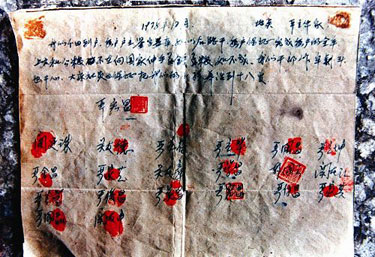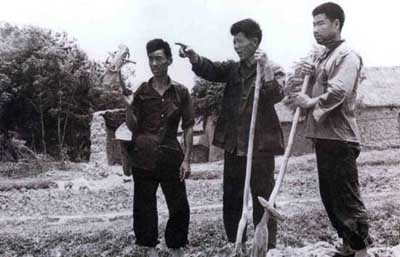"I was selected as the deputy leader and later as the leader of our production team in 1962. The grain output in our village was 15,000 kilograms per year before launching the household contract system. Food was not adequate to feed everyone. Families boiled tree leaves, bark and any edible wild plants; we ate whatever we could find. After consulting with some other villagers, I made up my mind to contract land to individual households no matter what penalty would be imposed on me. We didn't want to starve anymore," Yan said.
In 1978, 18 villagers at Xiaogang risked their lives to sign a secret agreement that divided the then People's Commune-owned farmland into pieces for each family to cultivate. They promised that each household would deliver a full quota of grain to the state and to the commune, and keep whatever remained.

However, their secret was disclosed the following spring. Some people accused Xiaogang's villagers of "digging up the cornerstone of socialism." Luckily, Fengyang Prefecture's Party Secretary, Wang Yuzhao, was open-minded. Yan had an audience with Wang, who had heard of Xiaogang's efforts and had been told that its harvests looked favorable. He promised to protect the village as long as their practice didn't spread. Later, Yan’s action received strong support from the then Party chief of Anhui Province, Wan Li, during a period of time when no official endorsement was given by the central government.
"Comrade Wang asked if I was a CPC member when visiting our village. I said no," Yan recalled, "He then praised my courage and agreed to allow us to practice the contract system for 3 years."
Grain output increased to 90,000 kilograms in 1979, over six times as much as the previous year. The per capita income of Xiaogang climbed to 400 yuan from 22 yuan.
